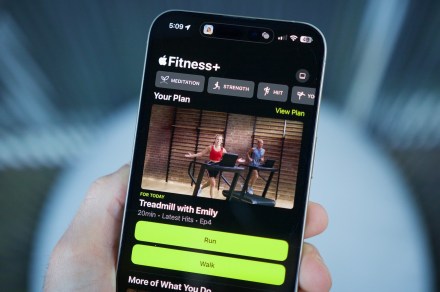
Why do health apps fail? Research bursts the hype with clear evidence
www.digitaltrends.com
Table of ContentsTable of ContentsWhy does this study matter?The key takeawayEarlier today, Apple announced plans for its next health study that aims to connect information collected by wearables with all major types of wellness markers. The idea is to build atop the massive corpus of data provided by users and develop new digital health tools, covering both sensor and software-based solutions.But are we relying too much on these digital health tools, despite not getting any meaningful benefits? Experts at the Technical University of Munich have just published their findings in a research paper, and it says the positive impact of telemedicine and exercise apps is minimal for at-risk people.Recommended VideosAs part of their study, which was conducted across 11 sites in Germany, the team focused on people living with type 2 diabetes and coronary heart disease. These are both serious health conditions, but with appropriate lifestyle changes, exercise, and diet, the risk factors can be contained to a healthy extent.Andy Boxall / Digital TrendsBut when it comes to making an impact, digital interventions such as apps, failed them. Around a quarter of the participants never started training as per the prescribed regimen, which they were supposed to follow via apps. Nearly half of the participants failed the meet the exercise goals even once per week.Please enable Javascript to view this contentThe current hype surrounding medical apps needs to be put into perspective, explains Martin Halle, Professor of Preventive Sports Medicine and Sports Cardiology at the German institute.As per the National Heart, Lung, and Blood Institute, coronary heart disease (CHD) was responsible for roughly 0.3 million deaths in 2022 in the United States. The US Centers for Disease Control and Prevention (CDC) says it is the most common type of heart disease, which means the stakes are as high as it gets.Type 2 diabetes, on the other hand, is prevalent in middle-aged and older folks. Notably, obesity and sedentary behavior are two of the main causative agents for this condition. Moreover, it has been known to worsen heart-related problems.As per the CDC, which runs the National Diabetes Prevention Program, lifestyle changes can reduce the incidence of type 2 diabetes by a 71% margin. This can be achieved through a mix of workouts and calorie intake reduction, both of which can get a push from apps.Andy Boxall / Digital TrendsSo, why did the patients volunteering for the latest study not derive any of those benefits, hawked by the likes of Apple, Fitbit, and Google?The study was conducted across two phases. In the first stage, participants got personalized health guidance through apps, and also phone call sessions asking about their progress.During the second phase, the participants were asked to follow the prescribed guidance independently. And thats where the cracks started to appear. After the end of the second phase, there were no more benefits, writes the team.According to the experts, getting used to modern technology is a challenge for older people, which is also one of the reasons why they couldnt derive the supposed benefits.The study, which has been published in the Nature Medicine journal, notes that over two-thirds of the patients found it rather difficult to understand and follow technical advice given by a health app. A recurring element is also the lack of human presence, and the in-person nudge that can make a real difference.Andy Boxall / Digital TrendsNumerous patients may have been overwhelmed by the demands of initiating lifestyle changes at home using multiple telemedical devices, despite repeated and continuous individual instructions and feedback, the paper explains.The team adds that an exclusively home-based lifestyle intervention using apps and other such telemedicine solutions may not be practical, clinically effective or cost-effective.The overarching conclusion is that for people living with conditions such as type 2 diabetes and coronary heart disease in the advanced stages of life, health apps will only work when human caretakers intervene on a timely basis.When individualized feedback is discontinued, the effects of a telemedicine-supported lifestyle intervention are not superior to usual care, concludes the paper.In my recent conversation with an expert at the American Heart Institute, they also highlighted that these digital tools are complementary, at best, and that we need expert intervention for the best care.Editors Recommendations
0 Commenti
·0 condivisioni
·52 Views


